Assigning Blame vs. Solving Problems
A while back, I came across a quiz question in a Judge Academy module. It asked "When a newer judge executes a task suboptimally that you assigned, who is responsible?" with the possible answers being "You", "The judge", "the judge's mentor", and "the tournament organizer".
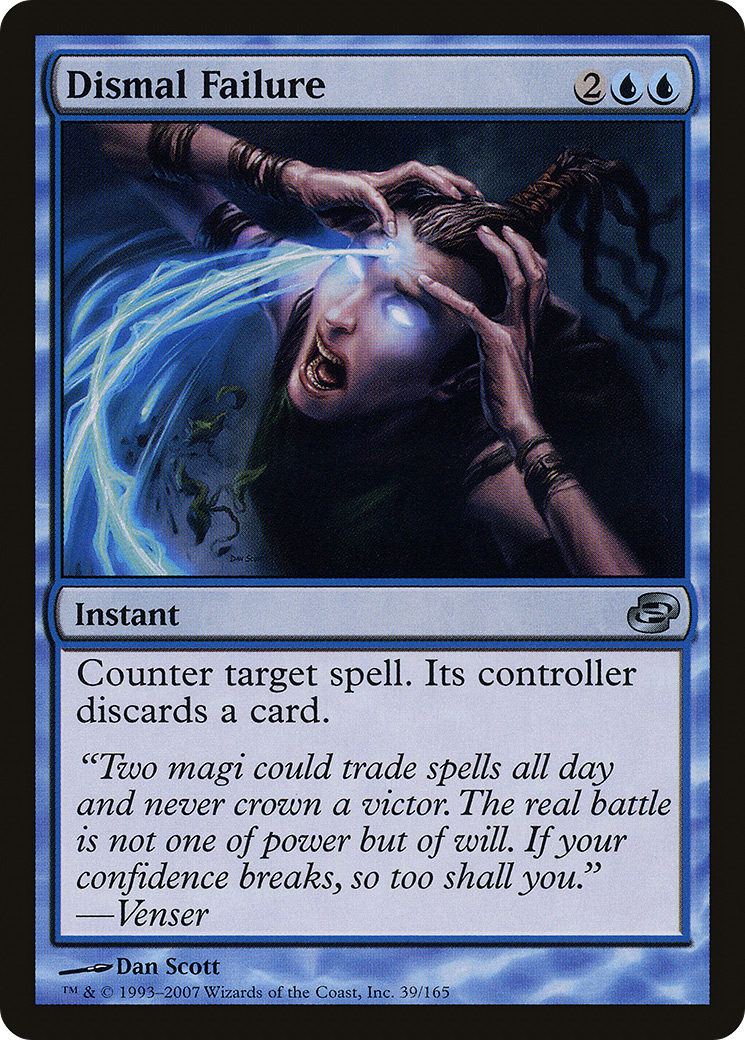
When something bad happens at a tournament, our job is to fix it and make sure it doesn't happen again. Often this means asking ourselves "what could we have done better?" In this situation, all 4 of the people involved could have done something better. The judge could have been more prepared for the tournament, the Team Lead could have confirmed that they knew how to perform the task before assigning it to them, the judge's mentor could have taught them that skill in advance, and the tournament organizer could have done a better job of making sure the judges they hired had the necessary skills.
In any particular situation, the measure of control that each person can exert on the outcome differs, and the question "who made a mistake" may have a different answer. If the task was an atypical one that doesn't normally comes up at tournaments, then the judge's decision to not study up on that skill in advance was very reasonable, and blaming them for not having done so is pure outcome bias. If the tournament was hectic and all the team members inexperienced, the team lead may have not had a better option than sending that judge to try and do that task as well as they could. And if the event didn't get enough applications, the organizer may have had no choice but to hire some unqualified judges.
Any reasonable analysis of how to prevent this situation from happening again would rely on much more information about what happened than was given in the question. It would result in a fairly complicated model where different people bear different amounts of responsibility for what happened.
Instead of teaching judges how to responsibly investigate the causes of the issue and address them, Judge Academy tells us to ignore the details of the situation and always pin the blame on specific people, regardless of their actual role in what happened.
When assigning blame is how you solve problems
We evolved to assign blame as a way to construct and maintain incentive systems.
Ideally we could always assign blame in proportion to the amount of agency that person had over the outcome, and the degree to which they could have foreseen it given the information they had at the time. But in complex systems, this is an intractable problem. It's therefore necessary to pick a small number of actors to blame for some failing, and ignore the other causes.
If a player casts a spell illegally, there are going to be many reasons this happened. Maybe their friend taught them the rules wrong. Maybe a spectator distracted them and they tapped the wrong lands. Maybe they have vision problems due to bad nutrition as a child. Maybe they were thinking about how they were going to handle their impending breakup. Trying to address all of those issues would not be feasible for the judge staff, so we tell players that "by joining this tournament, you agree to follow its rules and you agree that you will be the one held responsible if you fail to do so". This works because it provides an incentive for the player to handle all those second-order causes themselves, delegating the problem-solving to the person who's most able to solve those problems.
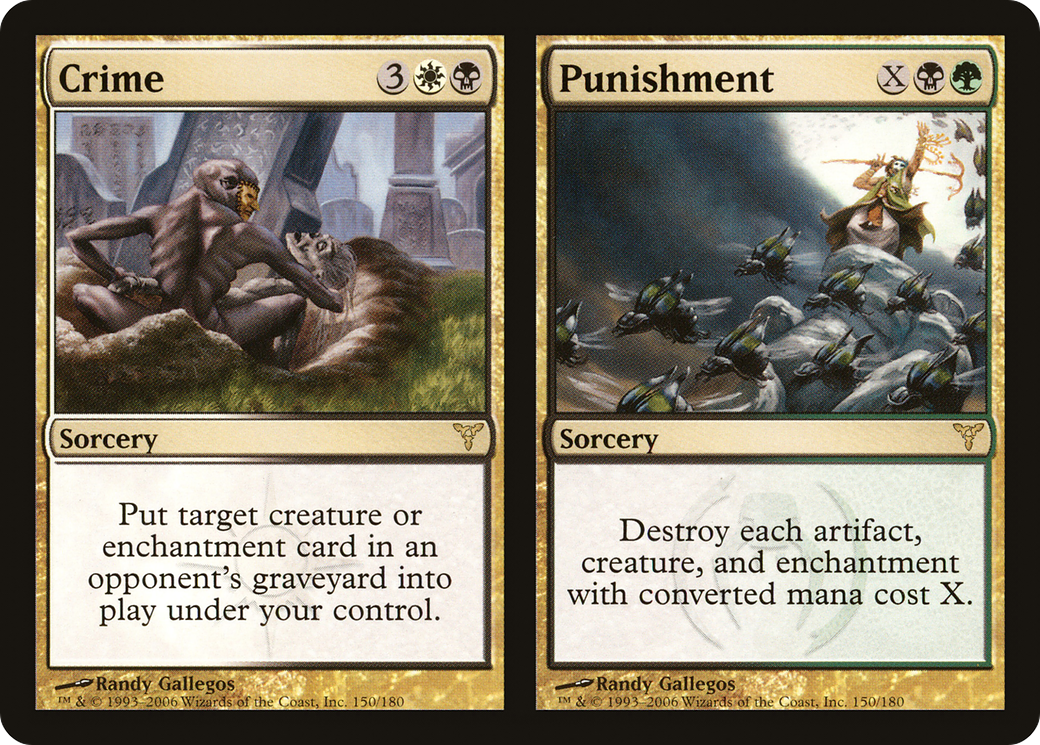
These sorts of considerations show up any time there's a need to punish or reward people. Is that criminal really the one responsible for the crime? Maybe they had a bad childhood and their parents are responsible. But aren't those parents also subject to outside forces? Maybe they grew up in a similar environment, and they were raising a child in the best way they knew how?
This is just as much of an issue with rewards. The Nobel prizes are often the source of controversy regarding who should have gotten the prize; collaborators sometimes get left out. But science is a communal effort, and in reality the discovery would not have been possible without the contributions of hundreds or thousands of other researchers, all the teachers who taught any of those people, all the people who funded the research, etc. The true casual chain for an event leads all the way back to the big bang, so one just has to choose a point at a sufficient level of abstraction to cut off the analysis.
So punishment and reward systems primarily exist to provide incentives towards the behavior we want to see. So whether it's the correct decision to punish the criminal or their parents depends on which one would result in the largest reduction in crime relative to the cost of the policy and other considerations.
When good instincts go rogue
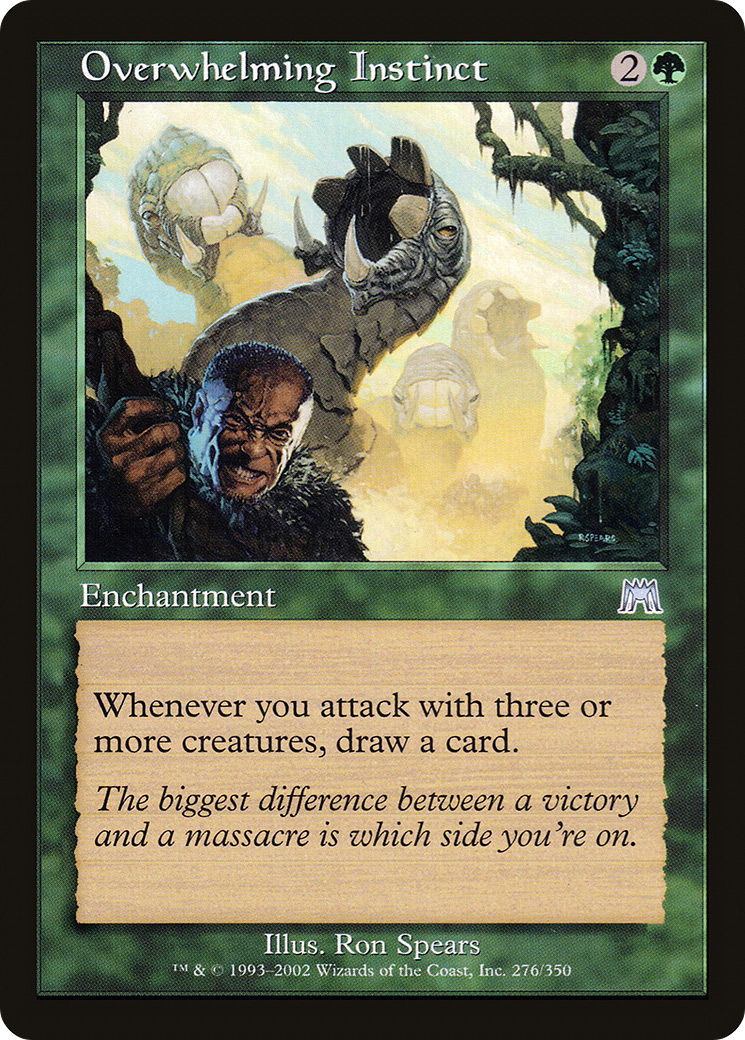
So the human urge to blame exists for good reason. But as an evolved instinct, it's not capable of taking into account all the nuances of every situation.
In these situations, blaming people has in effect become a subgoal of its own. People start focusing on blame as an end in-and-of-itself, and forget about whether this is actually productive in that context. Whenever anything bad happens, we instinctively start looking for someone to pin it on. Stubbed my toe on a rock? It's the rock's fault.
A great example of how this can go wrong is the environmentalism movement. The best ways to prevent global warming are things like carbon taxes and carbon sequestration, subsidies for solar/wind/nuclear/hydroelectric power, etc. But large factions of the environmentalism movement oppose these sorts of policies, because they don't sufficiently punish fossil fuel companies. These sub-factions of environmentalism don't actually care about preventing climate change at all; rather, they care about inflicting suffering on the people they consider responsible for climate change, and in this case, those are two very different goals.
The cognitive machinery of instinctive blame assignation is opaque to us, and we can't trust it to always make good decisions. So if we want to accomplish our goals in life, we need to look for better ways to figure out when it is or isn't appropriate to assign blame. We can do that by considering the likely consequences of actions.
Choices have consequences
You're walking home one day and see someone get hit by a car. The driver speeds off, and the pedestrian is left bleeding on the pavement. If you chose to continue your walk home rather than call an ambulance, people would likely be angry with you. You were presented with a choice- save them or let them die, and you chose for them to die. Sure, the driver also chose for this to happen. So what? The existence of other people's choices doesn't mean you didn't have any choices yourself.
Most people understand this when it's presented in a relatively neutral and straightforward context like that. But once it becomes convenient to believe otherwise, people tend to lose this understanding. They come up with elaborate rationalizations as to why it's actually ok to take actions that have bad outcomes for others while benefitting themselves. "Well I didn't cause the original situation, so if I choose not to fix it that's ok." (In other words, "people are less likely to notice that I chose for the bad thing to continue happening".)
the actual trolley problem that determines almost everything about our society pic.twitter.com/qtu5YLui0V
— Chaos (@chaosprime) February 1, 2021
These sorts of blame-avoidance games are easy to fall into. We start thinking about the world wholly in terms of who will be blamed for bad things, and how we can avoid it being us or the people we like. Sometimes the best way to avoid being blamed for a bad thing is to prevent the bad thing from happening, and that's great. But often it's easier to simply let the bad thing happen and blame someone else for it instead. When everyone is trying this second strategy, solutions stagnate. People get into an arms race, investing more and more effort canceling out each other's attempts to blame them, and no one is trying to actually fix the underlying problem.
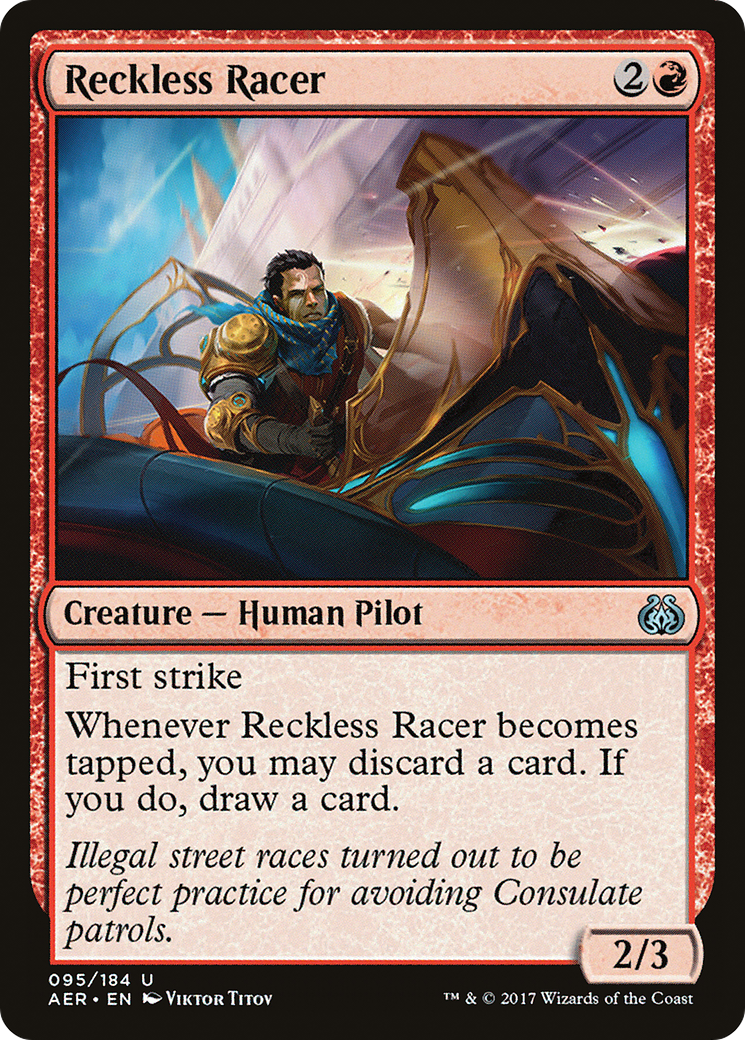
This can also lead us to be too eager to make sure the costs fall on the party at fault, even what that would have other bad outcomes. As part of the 5G rollout, it was discovered that commercial airplane electronics were operating outside their frequency
Every once in a while when I'm out driving, someone seems to be driving too quickly towards me, and I'm worried they might hit me. My instinctive reaction is to keep driving normally, since if they hit me, it'll be their fault, and they'll have to face the consequences for their stupidity. Then the actually intelligent part of my brain wakes up and starts screaming WHAT ON EARTH ARE YOU DOING YOU IDIOT‽ SWERVE OUT OF THE WAY SO YOU DON'T DIE.
Giving that first part of our brain too much control is what leads us to fall into the mindset of "I must take actions that avoid me being blamed for bad things" rather than "I must take actions that avoid bad things".
In other words, people were advocating for taking an action that they believed would likely result in global nuclear war. Millions of deaths, billions more suffering, all justified with "it's fine because we can blame this on someone else".
Mistake avoidance
At a recent tournament, I made a mistake that was very out of character for me. Afterwards, I took a few minutes to sit down in the back and try to figure out why that had happened. Another judge who was in the area asked me what I was thinking about, so I told them. They responded by trying to comfort me, telling me that we all make mistakes and I shouldn't beat myself up over it. I explained that I know that, I wasn't beating myself up over it, I was trying to figure out why it had happened. But they seemed to have trouble understanding the difference; they continued to tell me that it wasn't a big deal and I shouldn't feel bad about it.
That judge was right that we shouldn't beat ourselves up over our mistakes; that's unhelpful and often counterproductive. But we most certainly should put some effort into investigating why that mistake occurred
This sort of backwards reasoning also applies to our interactions with other people. If we get into the mindset of "informing people of a mistake is blaming them for it", that leads exactly where you'd expect: people not informing each other of mistakes, out of fear of being perceived as blaming them for it. This is an atmosphere that the judge program tries very hard to avoid; we can't improve if we don't learn about our mistakes. It's common for a judge to find out from a player that another judge made a mistake earlier in the tournament; when that happens, we need to be able to fix the problem, by letting that judge know what they did wrong and what the correct ruling would have been. If there's a stigma against brining up mistakes, that judge is going to continue issuing rulings, making the event worse for everyone.
The judge program goes to great lengths to avoid this atmosphere taking hold. We emphasize that making a single mistake is not going to get you decertified or blacklisted from staffing an event, because we understand that everyone makes mistakes, and it's important that we're able to talk about them without fear that they'll be used against us. One of the things I look for in an L2 candidate is what they do upon finding out about another judge's mistake. Do they actually take action to prevent that mistake from occurring in the future? That's what we want from the leaders in our community.
Victim-blaming
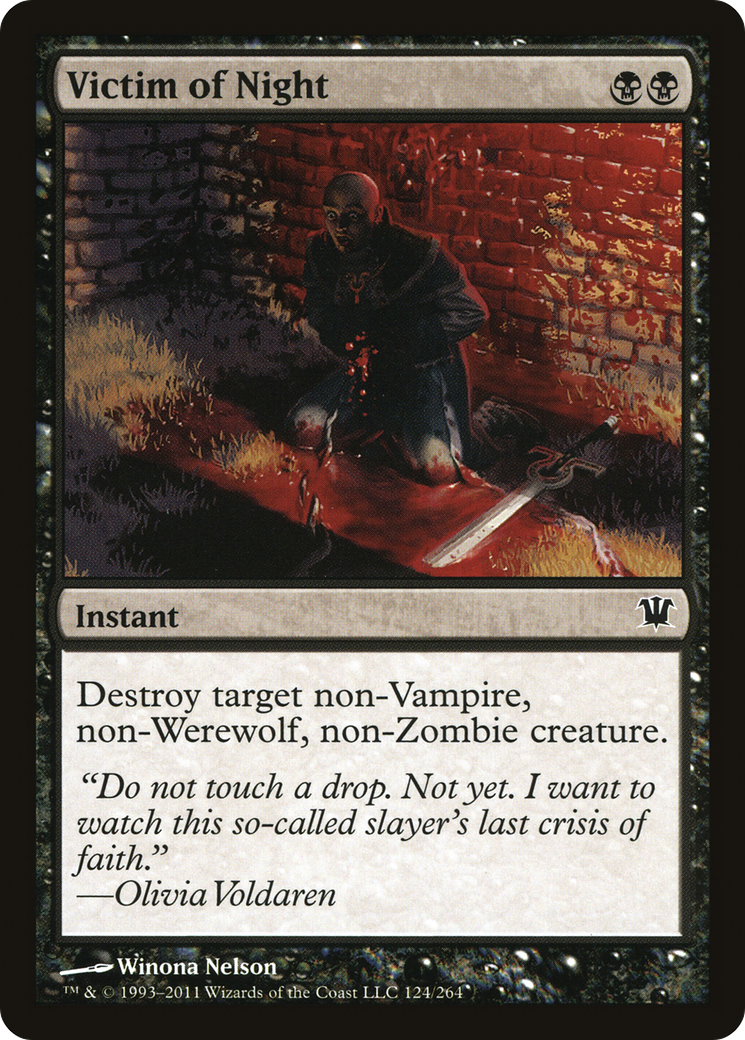
Someone walks home alone though a dark alley, and gets mugged. They go to the police station, and the police laugh at them and say "well, you really should know better than to walk alone in dark alleys". We'd consider this to be victim blaming, and bad behavior from the police. But why? After all, "don't walk alone in dark alleys" is pretty good advice.
No, the problem here is not the advice, but rather the lack of remedial action. The ideal response would be something like "ok, let's see what we can do about lowering the number of muggers in dark alleys. In the mean time, I'd recommend you stay out of those dark alleys, just until we can make them safer."
What we call "victim blaming" is the abdication of all responsibility onto the victim and the unwillingness to address the underlying issue. The victim is not at fault for the prevalence of muggers in the city and can't do anything about it, so blaming them for that is unproductive. But the victim does bear some responsibility for their own personal situation. If they continue to walk alone in dark alleys and get mugged over and over, we'd rightfully start to roll their eyes at their complaints.
It's one thing to wish that the world were a less a dangerous place and work towards that goal. It's another thing entirely to pretend that it isn't dangerous. Would it be great if we had safer cars? Absolutely! But if someone is driving recklessly and gets into a crash, we don't say "the world is at fault for not caring enough about road safety, and you are a victim of this apathy", we say "hey maybe you shouldn't have done that".
Pointing out that the victim had the ability to make a better choice is not victim-blaming. It becomes victim-blaming when the people assigning blame are doing so as a way to shift some of the blame away from themselves. Is it the manufacturer of a malfunctioning seat belt who's admonishing the driver for not having paid enough attention on the road? That's victim blaming.
Consider the difference between these three situations:
- A player complains to a judge about having been issued an incorrect ruling at a previous event. The judge says "well, you should have appealed", and does nothing else.
- A player complains to a judge about having been issued an incorrect ruling at a previous event. The judge says "I'm really sorry that happened. I'm going to talk to that judge and let them know what the correct ruling is, and help them understand the importance of double-checking any ruling they're uncertain of."
- A player complains to a judge about having been issued an incorrect ruling at a previous event. The judge says "I'm really sorry that happened. I'm going to talk to that judge and let them know what the correct ruling is, and help them understand the importance of double-checking any ruling they're uncertain of. And if something like this happens again, know that you're always allowed to ask for a second opinion from the head judge, and I would recommend doing it any time you think a floor judge's ruling might be wrong."
The first response attempts to dismiss the issue and put all the blame on the player, when it was really the judge who had the most control over the situation and should be changing their behavior.
Victim agency
The distinction here is between some nebulous concept of "blame" and that of agency. Does the victim have some measure of control over their situation? Do they have the ability to improve it? If so, refusing to help them see that is to choose for them to continue experiencing whatever bad things are happening to them.
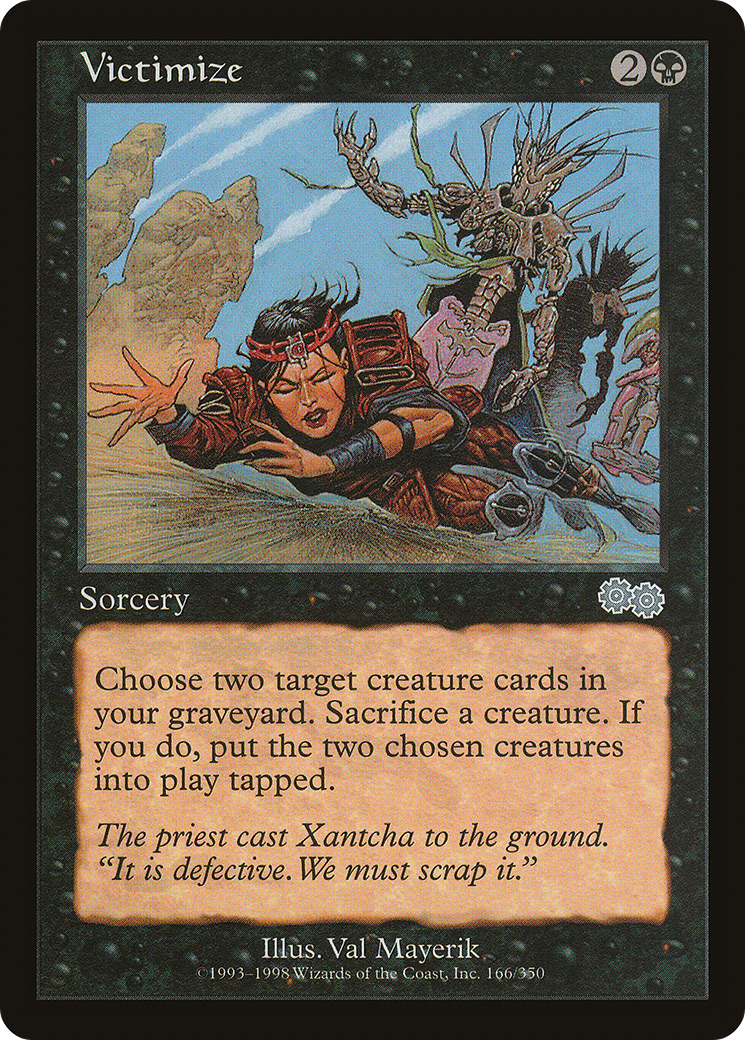
Victims of serious abuse know that simply blaming the abuser for their situation is unhelpful; the abuser isn't going to change. If the victim wants their situation to improve, they need to take responsibility for improving it themselves.
When people fall into victim mentality, it removes their ability to reflect on their own actions. A spiral of self-destructive behavior can result, where they blame anyone but themselves for their situation, and are unable to see how they themselves are a
As judges, it's often necessary to point out to victims that they have agency over their situation. Players will sometimes come up to us after their match, complaining that their opponent was cheating, or playing too slowly, or being rude, or any number of other things. Our response is always the same: "You should have called a judge when it happened."
I recently had a player, let's call them Alice, who was acting belligerent towards their opponent. A player in an adjacent match, Bob, suggested to Alice's opponent that they call a judge, which they promptly did. After I got there and started handling the situation, Bob continued to verbally engage with Alice, telling them they were going to get kicked out of the tournament for their behavior, and otherwise escalating the situation. This made my job much harder.
After the Alice situation was dealt with, I went and found Bob. I thanked them for their original suggestion to call a judge, and asked them to leave situations like that to us in the future, rather than further escalating the argument. Their response was to accuse me of victim-blaming, saying that they were defending Alice's opponent from Alice's inappropriate behavior, and they would absolutely do it again.
Bob thought (correctly) that Alice was behaving inappropriately, and thought (incorrectly) that Alice's poor behavior was sufficient justification for Bob to reciprocate with their own inappropriate behavior towards Alice. Seeing themselves as a victim had led to them excusing their own bad behavior, because "victims can do nothing wrong".
Setting aside the fact that the only real victim here was Alice's opponent, Bob misunderstood my communication as one pertaining to blame. I was not trying to pick people to blame for what happened; I was trying to solve the problem of heated arguments occurring in my tournament. Bob was someone with the ability to make decisions that could lead to a greater or lesser chance of such an argument occurring, and I was asking them to make the choice that would lead to a better outcome.
Understanding as endorsement
Our current society glorifies ignorance. Trying to learn more about something is seen as endorsement of it. People parade around claims of "I don't understand [thing]" as a badge of honor among people who hate [thing]. This leads to many problems
I was once at a judge conference where a judge was asking for advice handling a player who wouldn't trust any of their rulings
I asked why the player didn't trust them.
I was immediately pounced on for "blaming the judge for the player's bad behavior", told that my question was inappropriate, etc. Trying to understand the reasons for the player's behavior was interpreted as an endorsement of it.
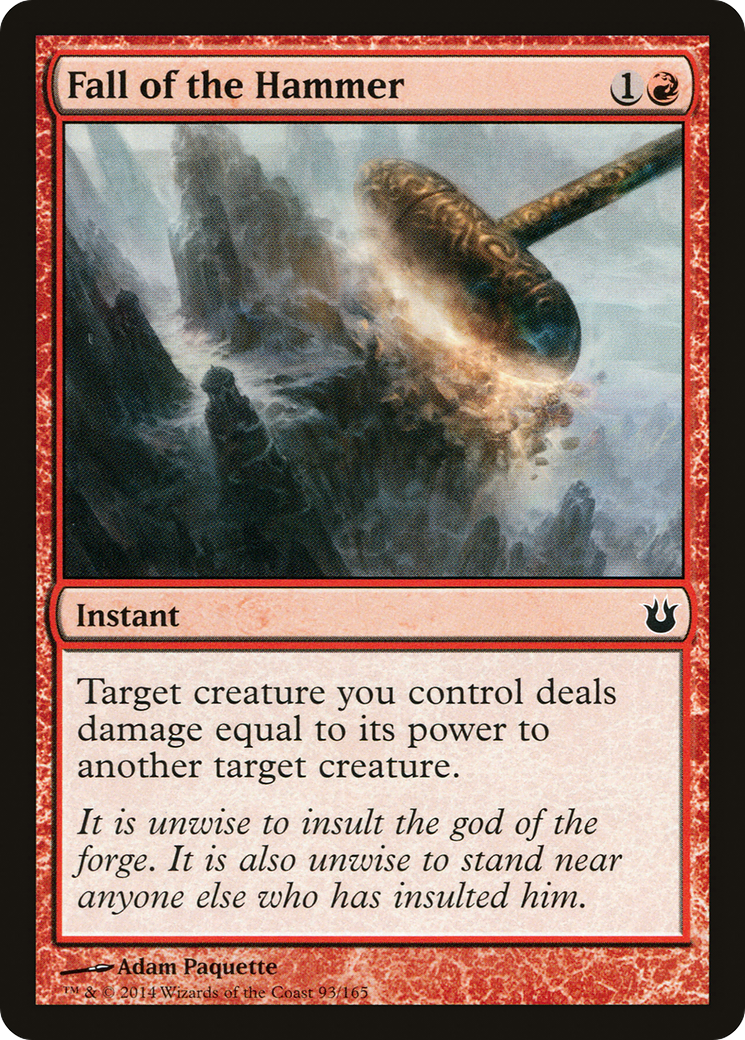
That judge could of course just bring the hammer down on the player, feel good about themselves for inflicting harsh punishment on the "bad guy", and then forget about the issue. That might "fix" the problem on a superficial level, in that there is no longer a player arguing with the judge's rulings. But what are the other consequences of that? Maybe that player stops playing at that store, and the community loses someone who otherwise could have contributed positively. Maybe that judge gains a reputation for being harsh or abusing their position, and other players stop trusting them as a result. Maybe none of those happen, and it just further sours a relationship. Has the problematic behavior stopped? Yes. Has the problem actually been fixed? Not so much.
Compare this to what could happen if the judge tries to see where the player is coming from and address the underlying issue:
- Does the player distrust the judge because they made a single incorrect ruling a long time ago? Then talk to them about the fact that we're human and make mistakes. Point out how all their other rulings since then have been correct. Explain that they care about doing a good job, and if the player provides a reason why they think the ruling is wrong, the judge will happily double-check.
- Have there been several incorrect rulings more recently? Well then the player's behavior is actually pointing at a serious issue, and the judge can now act on this feedback while helping the player understand what a more productive and less disruptive way to express that would have been. Now the judge has received valuable feedback that their rules/policy knowledge is deficient, and they can work on improving themselves and doing a better job for their local community.
- Is the player distrustful of authority in general? Maybe they've had bad interactions with the police, and they see judges as serving a similar role? Then being extra harsh on them is only going to exacerbate the issue. The judge could instead talk to them about how the judge is also a player, how we try to be as lenient as we can while maintaining tournament integrity, how we prioritize education over punishment, etc.
- Is there some underlying form of bias due to the judge being a part of some minority group? Most such biased decision-making is unconscious, so helping the player see the inconsistencies in their own behavior can be a step towards resolving the issue. If that doesn't work, that player can be dealt with however the store usually deals with discriminatory players. (Compare this to the approach above, where one specific behavior may have stopped, but the underlying bigotry will still be there and likely manifest in other ways. It has only treated a symptom; the actual problem remains completely unsolved.)
- Is the player themselves a part of a minority group, and they're frustrated because they always feel like the judges are discriminating against them? Well then the judge could take steps to investigate whether that's true, and try to set the player at ease that they're being treated consistently with all the other players.
- Is this player on good terms with a different judge, and they simply want a double-check on all other judges? Do they dislike this judge due to some previous personal issue that was unrelated to judging? Have all the rulings being going against them, and they're only arguing because they want a better outcome in their game? Or could it be any number of other reasons? No matter what's causing the player to behave inappropriately, understanding why it's happening allows us to actually fix the problem rather than just brush it under the rug by threatening harsh penalties if it gets brought up.
I attempted to talk about this on Facebook, and encountered an astounding amount of completely-missing-the-point. One judge responded "In every single one of your situations the player is behaving inappropriately." Another said "I think that regardless of the context, the truth remains that no judge should be automatically appealed." A third insisted "the player IS at fault, regardless of the context". One judge even thought I was arguing for downgrading the penalty.
The urge to equate understanding with endorsement is really strong. Even when I was explicitly calling it out, people still couldn't understand the difference between the statements "this is why [thing] is happening" and "[thing] is not a problem".
Putting blame to good use
The concept of "blame" is a useful one, but frequently misused. Evolution has instilled in us strong emotional responses to anything going wrong, and those instincts can sometimes misfire. Rather than default to "PERSON WAS SUPERFICIALLY RELATED TO BAD THING! MUST BLAME, PUNISH, INFLICT SUFFERING!", consider what that's actually going to accomplish. Don't be the judge who enjoys giving out penalties or looks for excuses to do so.
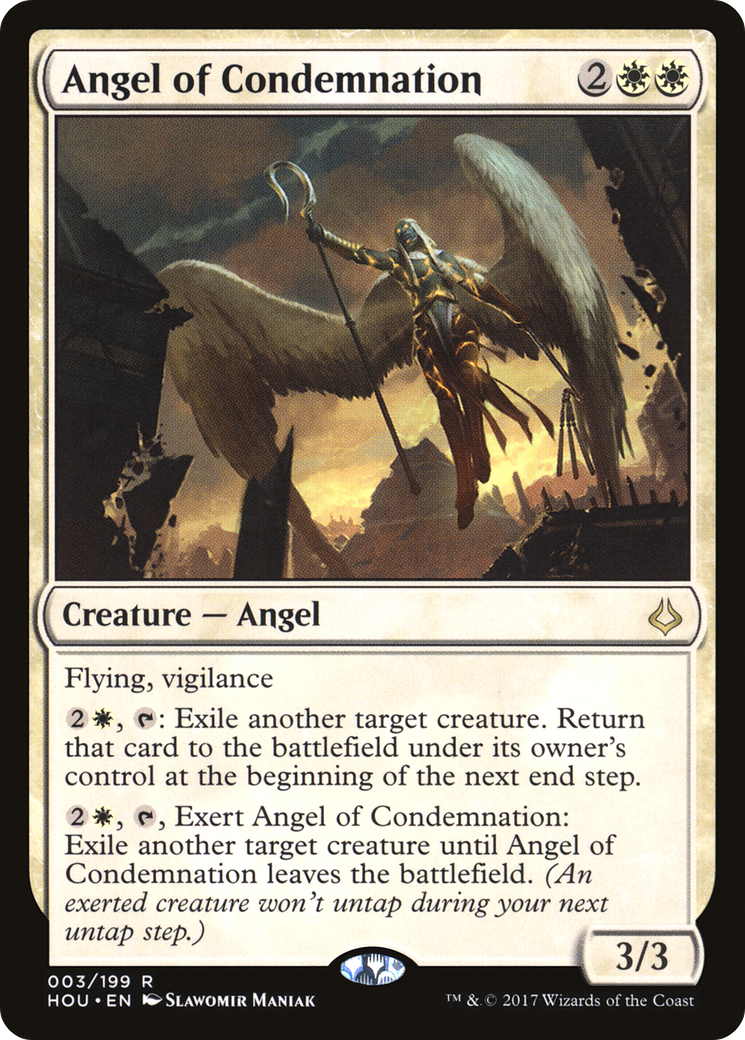
Our first priority as a judge should always be to fix the problem, and blaming people for having caused it is usually not going to do that. Only after the problem is fixed do we start thinking about responsibility. We then want to assign responsibility not based on some emotional anger response, but based on what will create the best incentives to avoid this problem in the future.
When two players in a tournament have a miscommunication and have conflicting understandings of the game state, we usually try to figure out who made the better attempt to communicate clearly, and rule in their favor. Is this because poor communicators are inherently evil and must be made to suffer? No, it's because this provides an incentive for the players to communicate better in the future.
"Blame", "fault", and "responsible for" are frequently overloaded terms. When they come up, ask yourself what's actually meant. Don't confuse "has the ability to fix the problem" with "bears some mystical karmic burden for what happened". Distinguish concepts like "your job is to make sure [thing] gets done" from "you have the ability to improve the chances of [thing] getting done" from "if [thing] doesn't get done, people will be upset with you".
Internalize the difference between talking about who is in a position to fix a problem vs. blaming people for that problem. Understand that talking about something is not the same as condoning it or blaming someone for it.
Think about how systems usually apportion blame, what incentives that creates for each participant, and whether there could be a better division.
We issue penalties as a means to accomplish a goal. There is nothing good about the penalty itself.